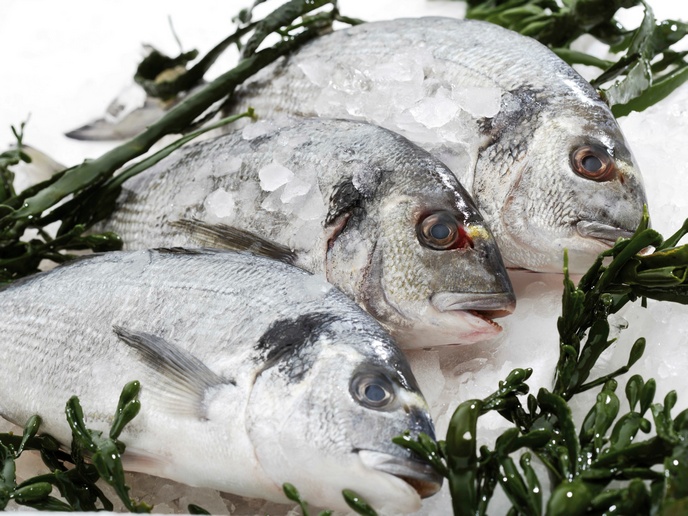Marine plants may hold the key to healthier farmed fish, according to recent findings from a European research collaboration that could transform aquaculture practices worldwide.
Norwegian and Spanish researchers have discovered that certain seaweed extracts can significantly reduce intestinal inflammation in farmed fish—a persistent challenge for the aquaculture industry as it attempts to develop more sustainable feed formulations.
The study focused on matrix metalloproteinases (MMPs), a family of enzymes found in vertebrates that, while essential for tissue repair and remodeling, can also contribute to inflammatory disorders. Researchers examined whether seaweed species with MMP-inhibitory properties could counteract intestinal inflammation when added to plant-based fish feed.
Three commercially important carnivorous species—Atlantic salmon, European seabass, and gilthead seabream—showed positive responses to the treatment. When extracts from both fresh and processed brown and red seaweeds were added to their diets, researchers observed significant inhibition of intestinal MMPs in all three species.
The findings come amid growing pressure on the aquaculture industry to reduce its reliance on marine-derived proteins and find sustainable alternatives that maintain fish health.
“Our in vitro simulations of the digestive process in Atlantic salmon and Mediterranean gilthead seabream demonstrate their high efficacy,” reported Neda Gilannejad, senior researcher at NORCE Norwegian Research Centre AS and co-author of the study.
Despite the promise of plant-based ingredients in fish feed, their introduction often triggers intestinal inflammation—a problem that has limited the aquaculture industry’s efforts to adopt more sustainable practices. This research suggests that seaweed supplementation might provide a natural solution to this persistent challenge.
The investigation employed laboratory techniques that simulated the digestive conditions of Atlantic salmon and gilthead seabream, confirming that experimental feeds containing algal meals maintained their anti-inflammatory effects throughout digestion—a crucial finding for practical applications.
Beyond the immediate health benefits, the research underscores the untapped potential of marine resources in addressing aquaculture challenges. “The findings demonstrate the importance of bioprospecting marine resources to address aquaculture’s pressing health challenges,” Gilannejad noted.
The study was supported by two major EU-funded initiatives: the recently concluded ALEHOOP project, which demonstrated the feasibility of protein extraction from legume by-products and validated the use of green macroalgae in animal feed over its five-year duration; and the ongoing BlueRemediomics project, set to continue until November 2026, which brings together experts from across Europe and South Africa to explore marine microbiome data.
These collaborations highlight a growing scientific interest in what might be called “blue resources”—marine organisms that can contribute to sustainable solutions across multiple industries.
As fish farming continues to expand globally to meet increasing protein demands, innovations like seaweed-enhanced feed could play a crucial role in ensuring both the sustainability and welfare of aquaculture operations.
For an industry constantly balancing economic viability with environmental responsibility and animal welfare, these findings offer a glimpse of how nature’s own remedies might provide solutions to some of its most persistent challenges.
For more information, please see:
Related Research
1. Reverter, M., Bontemps, N., Lecchini, D., Banaigs, B., & Sasal, P. (2014). Use of plant extracts in fish aquaculture as an alternative to chemotherapy: Current status and future perspectives. Aquaculture, 433, 50-61.
2. Valente, L. M. P., Araújo, M., Batista, S., Peixoto, M. J., Sousa-Pinto, I., Brotas, V., & Ozório, R. O. A. (2016). Carotenoid deposition, flesh quality and immunological response of Nile tilapia fed increasing levels of IMTA-cultivated Ulva spp. Journal of Applied Phycology, 28(1), 691-701.
3. Wan, A. H. L., Davies, S. J., Soler-Vila, A., Fitzgerald, R., & Johnson, M. P. (2019). Macroalgae as a sustainable aquafeed ingredient. Reviews in Aquaculture, 11(3), 458-492.
If our reporting has informed or inspired you, please consider making a donation. Every contribution, no matter the size, empowers us to continue delivering accurate, engaging, and trustworthy science and medical news. Independent journalism requires time, effort, and resources—your support ensures we can keep uncovering the stories that matter most to you.
Join us in making knowledge accessible and impactful. Thank you for standing with us!




